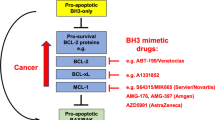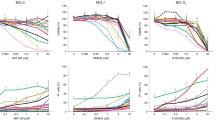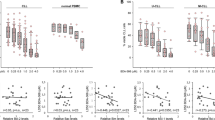Abstract
Bcr–Abl is the molecule responsible for both the transformation phenotype and the resistance to chemotherapeutic drugs found in chronic myelogenous leukemia (CML) cells. Wild-type HL-60, a transformed pro-myelocytic cell line, is very susceptible to apoptosis-inducing agents. We show here that expression of Bcr–Abl in HL-60 cells rendered them extremely resistant to apoptosis induced by a wide variety of agents. The anti-apoptotic effect of Bcr–Abl was found to be independent of the phase of the cell cycle. Treatment with antisense oligonucleotides directed to bcr decreased the expression of the ectopic bcr–abl and restored susceptibility to apoptosis. Double mutations affecting the autophosphorylation site and the phosphotyrosine-binding motif (FLVRES) have been previously shown to impair the transforming activity of Bcr–Abl in fibroblasts and hematopoietic cells, however HL-60 cells expressing this double mutant molecule exhibited the same level of resistance to apoptosis as those expressing the wild-type Bcr–Abl. Interestingly, wild type and mutant Bcr–Abl induced in HL-60 cells a dramatic down regulation of Bcl-2 and increased the levels of Bcl-xL. The level of Bax did not change in response to the presence of Bcr–Abl. Antisense oligonucleotides targeted to bcl-x down-regulated the expression of Bcl-xL and increased the susceptibility of HL-60.Bcr–Abl cells to staurosporine. Importantly, HL-60 cells overexpressing Bcl-xL showed higher expression of Bcl-xL but lower resistance to apoptosis when compared to HL-60.Bcr–Abl cells. The results described here show that Bcr–Abl is a powerful mammalian anti-apoptotic molecule and can act independently of Bcl-2. Bcl-xL, however, seems to participate in part in Bcr–Abl-mediated resistance to apoptosis in HL-60 cells.
This is a preview of subscription content, access via your institution
Access options
Subscribe to this journal
Receive 50 print issues and online access
$259.00 per year
only $5.18 per issue
Buy this article
- Purchase on Springer Link
- Instant access to full article PDF
Prices may be subject to local taxes which are calculated during checkout
Similar content being viewed by others
Author information
Authors and Affiliations
Rights and permissions
About this article
Cite this article
Amarante-Mendes, G., McGahon, A., Nishioka, W. et al. Bcl-2-independent Bcr–Abl-mediated resistance to apoptosis: protection is correlated with up regulation of Bcl-xL. Oncogene 16, 1383–1390 (1998). https://doi.org/10.1038/sj.onc.1201664
Received:
Revised:
Accepted:
Published:
Issue Date:
DOI: https://doi.org/10.1038/sj.onc.1201664
Keywords
This article is cited by
-
USP10 modulates the SKP2/Bcr-Abl axis via stabilizing SKP2 in chronic myeloid leukemia
Cell Discovery (2019)
-
BCR–ABL1-induced downregulation of WASP in chronic myeloid leukemia involves epigenetic modification and contributes to malignancy
Cell Death & Disease (2017)
-
Platinum pyrithione induces apoptosis in chronic myeloid leukemia cells resistant to imatinib via DUB inhibition-dependent caspase activation and Bcr-Abl downregulation
Cell Death & Disease (2017)
-
Nickel pyrithione induces apoptosis in chronic myeloid leukemia cells resistant to imatinib via both Bcr/Abl-dependent and Bcr/Abl-independent mechanisms
Journal of Hematology & Oncology (2016)
-
High CIP2A levels correlate with an antiapoptotic phenotype that can be overcome by targeting BCL-XL in chronic myeloid leukemia
Leukemia (2016)



